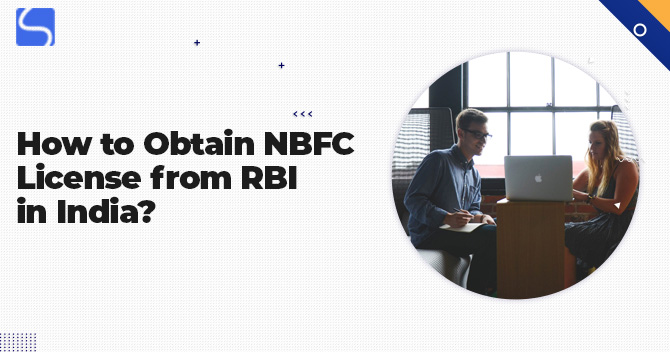How to Obtain NBFC License from RBI in India?

Karan Singh | Updated: May 15, 2021 | Category: NBFC
NBFCs play a crucial role in the financial introduction and country-building by combining hands with the banking sector for delivering credit to the unbanked segment of the society, chiefly the MSMEs (Micro, Small and Medium Enterprises), which form the practising ground for entrepreneurship and innovation/creation. Non-Banking Financial Companies capability to modify and innovate or create products as per the customer’s requirements gives them a fringe over the banking systems. Scroll down to check more information regarding How to obtain an NBFC license from RBI (Reserve Bank of India).
Table of Contents
Importance of NBFCs
The Government of Indian is more focusing on encouraging entrepreneurship to transform the nation’s status from a pool of job aspirants to a pool of job creators. This can aid Non-Banking Financial Companies to utilize their full capability and work with greater competence. Other than this, the banking system is suffering many restrictions in terms of extension, which further covers the way for NBFCs to play an essential role in the Indian Financial System.
Non-Banking Financial Companies have emerged to be the growth engines for tiny scale and retail sectors in the sectors which are still outside the banking system’s reach. The regulatory structure of Non-Banking Financial Companies have undergone an extensive collection of changes ranging from simplified regulations to broad regulations and finally towards explanation as a part of the currently revised NBFC framework in the year 2014.
What are the Necessities for Procuring NBFC License from RBI in India?
Usually, Non-Banking Financial Companies are required to be incorporated under Section 45 IA of the RBI Act (1934)[1]; however, before applying for the NBFC license with the Reserve Bank of India, the following circumstances shall be satisfied to commence operations as a Non-Banking Financial Company:
- The desiring company should be a company that is registered under the Companies Act, 2013 or 1956;
- It must have minimum disposable NOFs (Net Owned Funds) of Rs. 2 crores.
Vital Documents Required for Procuring NBFC License from RBI
Following are some vital documents required at the time of obtaining an NBFC License from RBI in India:
- Submit the certified copies of the Certificate of Registration (COR) of the company;
- Submit the copies of MOA (Memorandum of Association) and AOA (Articles of Association) of the company;
- CIBIL Score or Credit Score of company’s director;
- Submit a copy of the CIN or PAN of the company;
- Submit a board resolution stating that the company has not accepted any public deposit and it wouldn’t accept a public deposit in the future;
- Board resolution offering that the company is not operating any NBFC activity and will not carry until it gets Registration from the Reserve Bank of India;
- Submit the certified copy of Board Resolution for fair practices code;
- Previous three years audited balance sheet.
Procure NBFC License from RBI
After following all the necessities mentioned above, an online application available on the official website of RBI should submit the form along with the vital documents. After filing the application, a CARN will be generated, which can be used to examine the status of applied NBFC Registration. In the meanwhile, the physical copy of the application form along with the relevant documents shall be submitted to the original office of the Reserve Bank of India.
The application, whether offline or online, must be complete in every factor. The NBFC license granted after proper examination of the application and attached documents and being fulfilled that the desirous company has complied with all the rules & regulations applicable. NBFC Registration can be procured only after following the suggested procedures and arranging all the relevant documents for NBFC Registration.
Represented NBFC Regulatory Framework
To encourage Non-Banking Financial Companies as a vital segment of the Indian Financial Market, The Government of India has represented their regulatory framework or structure. Suitably, Non-Banking Financial Companies with no customer interface and no public funds are not subjected to any prudential norms and are free to operate their activities.
Previous, all Non-Banking Financial Companies were subject to supremacy necessities, like the FPC (Fair Practices Code), Anti Money Laundering, etc., thereby increasing the compliance load. Under the new structure or framework, only Non-Banking Financial Companies having a client interface are required to obey such governance necessities. But, to make sure that such leverages don’t spoil the true motives for which the Non-Banking Financial Companies have been established, they are required or maintain leverage a ratio of seven that means the total outside liabilities is not more than seven times their owned funds.
To make the process of NBFC Registration easy and hassle-free, former Governor of RBI, Dr Raghuram Rajan, declared in the policy for 2015-16 that the process for NBFC Registration would be represented and rationalized. The new applications are to be made easier, and the number of documents needed to be attached with the application form will also be reduced to a minimum.
The Reserve Bank of India is regularly working in the field of NBFCs by establishing different committees to seek advice on the role of Non-Banking Financial Companies in the growth of the economic sector. Non-Banking Financial Companies have developed as the medium for meeting the financial needs of several sectors, rising as better alternatives to the banking system.
Conclusion – NBFC License from RBI
The futures changes in the sector will promote strengthen and also permit the Non-Banking Financial Companies to operate in an authorizing regulatory environment. According to the report, Non-Banking Financial Companies have been the biggest receiver of funds from the rest of the financial system.
Read our article: How to get an NBFC P2P License in India?















